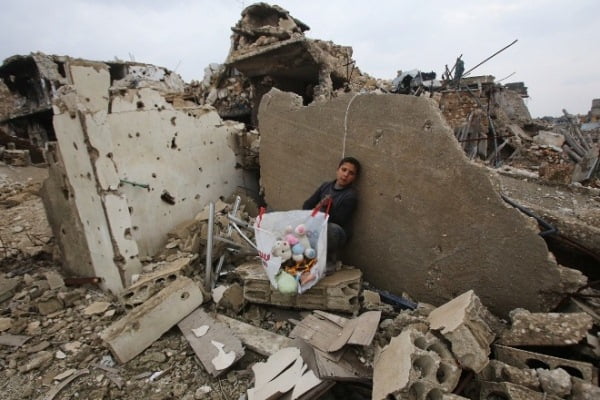Abdel Halim Khaddam, the former Syrian Vice President, holds Western countries, primarily the United States, and the Syrian opposition responsible for the fall of Aleppo city to the Syrian regime and the countries that support it. Four and a half years after the withdrawal of the armed opposition in the eastern neighborhoods of Aleppo, Khaddam offers Elaf, in an exclusive interview, a different vision of the war in Syria. He says that the opposition should not form an army but groups that weaken the regime.
He believes that there may come a time when a collision will break out between Russia and Iran in Syria, where their priorities differ. While the Russian leadership wants to expand its influence in the Middle East and make Syria the center of this expansion, Iran considers Syria a corridor to deliver weapons to Hezbollah in Lebanon and spread the Shiite faith in the Arab region. Bashar Al-Assad sought help from the Islamic Republic after being accused of the assassination of former Lebanese Prime Minister Rafik Hariri.
This involves the spread of Shiism and the alteration of the national, ethnic, and religious structure in Syria. During President Hafez al-Assad’s time, an Iranian delegation came to the Syrian coast and attempted to persuade the Alawites to join the Shiite sect in Iran, but they refused. This delegation then visited President Assad and presented the matter to him. However, President Assad only instructed his Foreign Minister to inform the Iranian ambassador that these Iranian Sheikhs should leave Syria within 24 hours. Nevertheless, under Bashar Al-Assad, things changed because he sought refuge in Iran after being accused of the assassination of former Lebanese Prime Minister Rafiq Hariri. The Islamic Republic has taken advantage of its alliance with the Syrian regime to supply weapons, sheikhs, and money to Hezbollah in Lebanon. Therefore, Iranian goals differ from Russian goals, and a clash between Russia and Iran may occur in Syria.
Bashar is a pawn in the game played by Russia and Iran.
Are the Russian and Iranian roles coordinated in Syria?
No, there is a difference between the Russian and Iranian strategies and Bashar Al-Assad’s strategy. It’s a game being played by Russia and Iran. Since the Islamic Revolution, Iran has focused on promoting Shiism among Shiites, especially in areas where Shiites are the majority. This is evident through the establishment of Hezbollah and affiliated parties in Iraq that have ties to Iran. Iran’s objective is to spread Shiism and alter the national, ethnic, and religious fabric of Syria. During President Hafez al-Assad’s time, an Iranian delegation arrived on the Syrian coast and attempted to persuade the Alawites to join the Shiite sect in Iran, but they refused. This delegation then visited President Assad and presented the matter to him. However, President Assad only instructed his Foreign Minister to inform the Iranian ambassador that these Iranian Sheikhs should leave Syria within 24 hours. However, under Bashar Al-Assad, things changed as he sought refuge in Iran after being accused of the assassination of former Lebanese Prime Minister Rafiq Hariri. The Islamic Republic has capitalized on its alliance with the Syrian regime to deliver weapons, sheikhs, and money to Hezbollah in Lebanon. Therefore, Iranian goals differ from Russian goals, and a clash between Russia and Iran may occur in Syria.
What are Russia’s goals in Syria?
Russia’s goals in Syria are strategic. The Russian leadership aims to expand its influence in the Middle East and establish Damascus as a center for expanding its relationships. However, the military operation led by Russian President Vladimir Putin contradicts this goal. As a result, the Russian approach may soon change, and there may be a retreat from the use of force, which has alienated the Syrian people from Russia. In the past, Russia was one of the most important allies of Damascus in the former Soviet Union. The Soviet Union supported Syria, Egypt, and Iraq by providing military, economic, and political assistance. Consequently, Syria was a close friend of the Soviet Union. However, Syria’s relationship with Russia has changed, and Russian President Vladimir Putin has a broader perspective beyond Syria. He aims to restore international power and position in the world, which he had the opportunity to pursue during the tenure of President Barack Obama. Before my departure, I met with Russian President Vladimir Putin, and we had a fruitful conversation. I felt that he was a man with whom we could cooperate, similar to the cooperation with the Soviet Union.
Dragoon groups, not armies
Aleppo is located in what has become known as a strategically important area in Syria, linking Damascus to Aleppo through Homs and Latakia. Did the opposition make mistakes in the battle for Aleppo that cost them the city?
The Syrian opposition bears primary responsibility. Instead of uniting, we see twenty opposition organizations. I have already sent a letter to the opposition National Council and another to the coalition, expressing that division facilitates defeat, while unity brings victory and support. How can we fight against a regime that has 350,000 fighters and warplanes if we are fragmented? The Syrian opposition made a mistake. They should not have formed a single army but rather groups that put pressure on the regime. Unfortunately, this did not happen. In order to achieve a democratic system in Syria, there must be democratic people. Division does not serve the country. Therefore, the opposition shares some responsibility for the loss of Aleppo.
What changes may we see in Syria after Aleppo?
The landscape has significantly shifted in Syria. The opposition has lost its capabilities, and the situation has become even more challenging for the Syrian people, particularly after Russia’s involvement in the conflict. Syrians, especially those who possess rational thinking and believe in Syria’s right to freedom, justice, and equality, should seek an alternative path to salvation. This path should lead to the overthrow of the regime, the removal of Iran and Russia from Syria, and the restoration of normal relations between the Syrian people and other countries. What this means is that Syrians need to win the support of the international community without compromising their principles, as the main problem faced by the Syrian people is the regime and its crimes. However, another problem has emerged with the title of protecting Assad. Iran and Russia have intervened in the conflict. Russia has utilized all its essential weapons, except for destructive ones. This incurs a significant cost at a time when the Russian economy is declining. However, Putin did not enter the war in Syria to deploy his weapons against the Syrian people in support of Bashar al-Assad. The United States bears full responsibility. While Turkey was its ally, the United States armed Kurdish extremists, and these weapons were later turned against Turkey.


